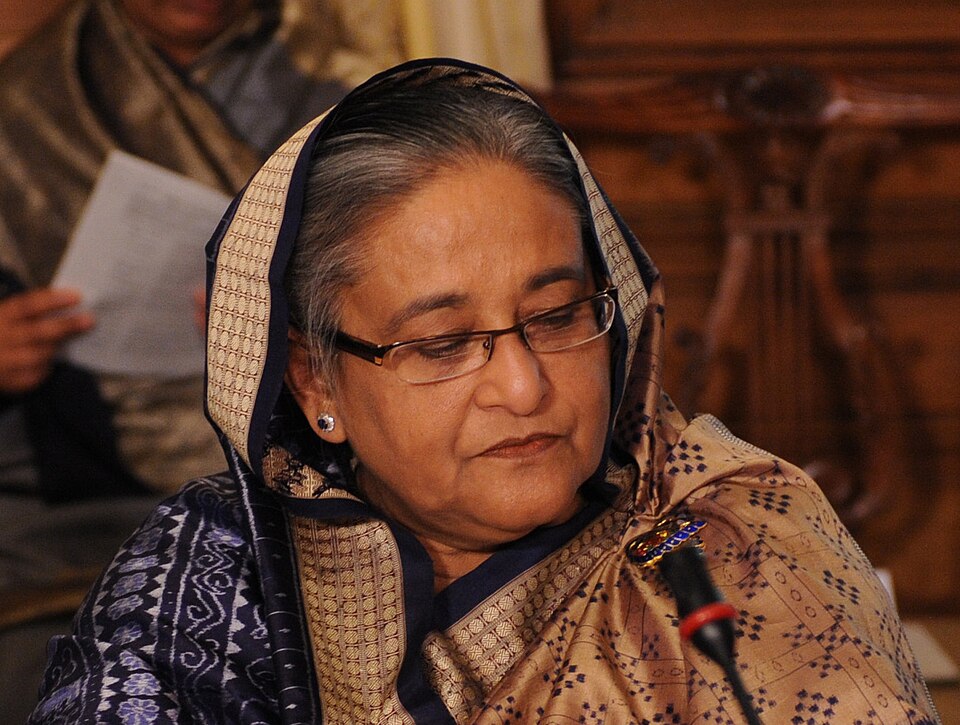Former Prime Minister Sheikh Hasina reportedly “issued an open order” to use “lethal weapons” on student protesters opposing her government’s policies last year, according to secret phone call recordings obtained by Al Jazeera Investigative Unit (I-Unit) and Will Thorne.
These recordings suggest that Hasina authorized the use of force against the demonstrators, directing security forces to “shoot wherever they find them.”
Hasina, who governed Bangladesh for 15 years, resigned on August 5 following weeks of violent protests and government crackdowns that resulted in the deaths of nearly 1,400 people and left over 20,000 injured, according to the International Criminal Tribunal (ICT) in Bangladesh.
The I-Unit’s investigation involved having the recordings analyzed by audio forensic experts to verify their authenticity, including matching the voices of the callers. One particular phone call, recorded on July 18 by Bangladesh’s National Telecommunications Monitoring Centre (NTMC), captures Hasina telling an ally that she had given security forces the green light to use lethal force against the protesters.
“My instructions have already been given. I’ve issued an open order completely. Now they will use lethal weapons, shoot wherever they find them,” Hasina reportedly stated. “That has been instructed. I have stopped them so far… I was thinking about the students’ safety.”
Later in the same conversation, Hasina, speaking with Dhaka South Mayor Sheikh Fazle Noor Taposh, another relative, discussed using helicopters to monitor and control the protests, revealing a broader strategy to suppress the dissent from above. “Wherever they notice any gathering, it’s from above – now it’s being done from above – it has already started in several places. It has begun. Some [protesters] have moved,” she said.
At the time, Bangladeshi authorities denied any aerial assaults on protesters, but Dr. Shabir Sharif, an accident and emergency doctor at Dhaka’s Popular Medical College Hospital, confirmed that shots had been fired from a helicopter targeting the hospital entrance. He described treating protesters who sustained unusual bullet wounds, adding that the bullets appeared to be large and remained embedded in the victims’ bodies. The specific type of bullets has not been verified.
These conversations could be presented as crucial evidence in Hasina’s upcoming trial, with prosecutors preparing to charge her, along with her ministers and security personnel, with crimes against humanity. On July 10, Hasina and two other officials were indicted, with the trial set to begin in August.
The NTMC, which recorded these calls, is known for its surveillance capabilities, having been accused of monitoring not just opposition figures but also Hasina’s political allies. According to Tajul Islam, chief prosecutor for the ICT, Hasina was aware that her calls were being intercepted. “In some cases, the other side would say, ‘We should not discuss this over the phone.’ To which the prime minister would reply, ‘Yes, I know, I know, I know, it’s being recorded, no problem,’” Islam stated.
The student protests began in June 2024 after the reintroduction of a controversial state job quota system that many students believed was skewed in favor of the ruling Awami League. The protests gained national attention after the police shot and killed student Abu Sayed on July 16, which led to a nationwide outcry and escalated the unrest.
In one of the intercepted calls, Sheikh Fazle Noor Taposh’s ally, Salman F Rahman, is heard pressuring the police to expedite the release of Sayed’s post-mortem report. Rahman is heard questioning the police’s delay in providing the report and expressed concern over discrepancies in the findings.
Dr. Rajibul Islam from Rangpur Medical College, who conducted the post-mortem, revealed that police had pressured him to alter the report to suggest that Sayed had died from injuries caused by stone-throwing rather than gunshot wounds. The government has faced accusations of attempting to cover up the deaths caused by its security forces.
In the aftermath, Sayed’s family was summoned to a staged meeting with Hasina at her official residence, Ganabhaban, where the PM handed out compensation money to the families of those killed. During the televised event, Sayed’s sister, Sumi Khatun, confronted Hasina, questioning the need for an investigation given the clear evidence that Sayed had been shot by police.
In response to the allegations, an Awami League spokesperson denied that Hasina had specifically authorized the use of lethal force, dismissing the recordings as either “cherry-picked” or “doctored.” The spokesperson also defended the government’s efforts to investigate Abu Sayed’s death as “genuine.”
This report, originally published by Al Jazeera Investigative Unit, sheds light on the darker side of Bangladesh’s political landscape during a time of severe civil unrest, raising questions about the government’s response to dissent and its accountability for the violence during the 2024 protests.


